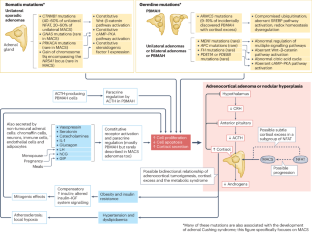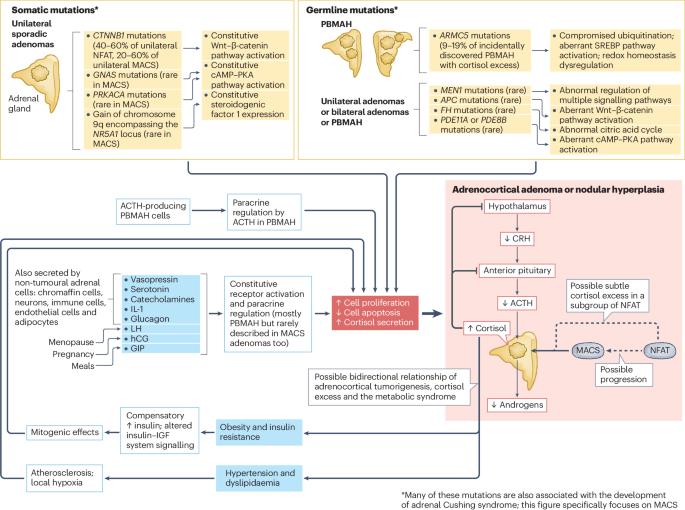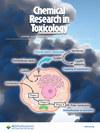Mild autonomous cortisol secretion: pathophysiology, comorbidities and management approaches
IF 3.7
3区 医学
Q2 CHEMISTRY, MEDICINAL
引用次数: 0
Abstract
The majority of incidentally discovered adrenal tumours are benign adrenocortical adenomas and the prevalence of adrenocortical adenomas is around 1–7% on cross-sectional abdominal imaging. These can be non-functioning adrenal tumours or they can be associated with autonomous cortisol secretion on a spectrum that ranges from rare clinically overt adrenal Cushing syndrome to the much more prevalent mild autonomous cortisol secretion (MACS) without signs of Cushing syndrome. MACS is diagnosed (based on an abnormal overnight dexamethasone suppression test) in 20–50% of patients with adrenal adenomas. MACS is associated with cardiovascular morbidity, frailty, fragility fractures, decreased quality of life and increased mortality. Management of MACS should be individualized based on patient characteristics and includes adrenalectomy or conservative follow-up with treatment of associated comorbidities. Identifying patients with MACS who are most likely to benefit from adrenalectomy is challenging, as adrenalectomy results in improvement of cardiovascular morbidity in some, but not all, patients with MACS. Of note, diagnosis and management of patients with bilateral MACS is especially challenging. Current gaps in MACS clinical practice include a lack of specific biomarkers diagnostic of MACS-related health outcomes and a paucity of clinical trials demonstrating the efficacy of adrenalectomy on comorbidities associated with MACS. In addition, little evidence exists to demonstrate the efficacy and safety of long-term medical therapy in patients with MACS. Mild autonomous cortisol secretion from benign adrenocortical adenomas (usually diagnosed incidentally) is associated with cardiometabolic risk and other comorbidities, but without the signs of overt Cushing syndrome. This Review outlines the mechanisms, complications and comorbidities, diagnosis and management of mild autonomous cortisol secretion.


轻度自主皮质醇分泌:病理生理学、并发症和管理方法
大多数偶然发现的肾上腺肿瘤都是良性肾上腺皮质腺瘤,腹部横断面成像中肾上腺皮质腺瘤的发病率约为 1-7%。这些肿瘤可能是无功能的肾上腺肿瘤,也可能与自主皮质醇分泌有关,其范围从罕见的临床上明显的肾上腺库欣综合征到更常见的无库欣综合征症状的轻度自主皮质醇分泌(MACS)。20%-50%的肾上腺腺瘤患者会被诊断为轻度自主皮质醇分泌综合征(基于异常的地塞米松抑制试验)。MACS 与心血管疾病、虚弱、脆性骨折、生活质量下降和死亡率升高有关。对 MACS 的治疗应根据患者的特点进行个体化,包括肾上腺切除术或保守随访以及相关合并症的治疗。鉴别最有可能从肾上腺切除术中获益的 MACS 患者具有挑战性,因为肾上腺切除术可改善部分而非所有 MACS 患者的心血管发病率。值得注意的是,双侧 MACS 患者的诊断和管理尤其具有挑战性。目前 MACS 临床实践中存在的不足包括缺乏诊断 MACS 相关健康结果的特定生物标志物,以及缺乏证明肾上腺切除术对 MACS 相关并发症疗效的临床试验。此外,几乎没有证据证明对 MACS 患者进行长期药物治疗的有效性和安全性。
本文章由计算机程序翻译,如有差异,请以英文原文为准。
求助全文
约1分钟内获得全文
求助全文
来源期刊
CiteScore
7.90
自引率
7.30%
发文量
215
审稿时长
3.5 months
期刊介绍:
Chemical Research in Toxicology publishes Articles, Rapid Reports, Chemical Profiles, Reviews, Perspectives, Letters to the Editor, and ToxWatch on a wide range of topics in Toxicology that inform a chemical and molecular understanding and capacity to predict biological outcomes on the basis of structures and processes. The overarching goal of activities reported in the Journal are to provide knowledge and innovative approaches needed to promote intelligent solutions for human safety and ecosystem preservation. The journal emphasizes insight concerning mechanisms of toxicity over phenomenological observations. It upholds rigorous chemical, physical and mathematical standards for characterization and application of modern techniques.

 求助内容:
求助内容: 应助结果提醒方式:
应助结果提醒方式:


